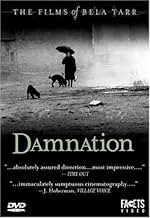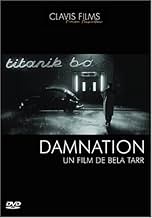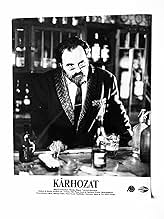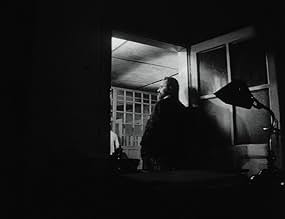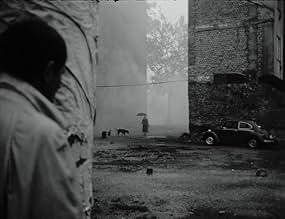NOTE IMDb
7,6/10
7,2 k
MA NOTE
Ajouter une intrigue dans votre langueA lonely barfly falls in love with a married bar singer.A lonely barfly falls in love with a married bar singer.A lonely barfly falls in love with a married bar singer.
- Réalisation
- Scénario
- Casting principal
- Récompenses
- 2 victoires et 1 nomination au total
Avis à la une
In a town that is quite possibly the wettest place on Earth, the permanently raincoat-clad "Karrer" (Miklós Székely B) goes through the motions with a life that is little more animated than his dreich surroundings. What sustains him through the grand ennui of his existence is his love for the married singer in the gloomy "Titanik" bar (Vali Kerekes) for whom he declares, repeatedly, his undying love and for whose husband "Willarsky" (Gyula Pauer) he has little but contempt. Luckily for him, though, the guy is in almost permanent debt so is away frequently enough for the two to indulge their relationship, infatuation, addiction now and again. That's about the height of it. Can this ever decreasing circle ever change? What's quite intriguing about this cinematic festival of monochrome melancholia is that the story is almost irrelevant to what Béla Tarr seems to be offering us here. The photography is dank and dreary, the constant tracking shots, panning shots, lingering close ups of the rain dripping from branches or the faces of the customers in the bar - none of those actually do anything to support the plot, but they add a delicious richness to the whole allure of this film. There's a song - almost as depressing as the weather, completed by a gentle saxophonist that I felt rather summed up the whole ambiance of this glacially paced exercise in bleakness. I'm no film critic and am not in a position to write some extensive exposition on what motivated the director or how original his techniques at story telling are, I can only judge what was put before me for two hours and though, yes, at times it is downright dull, at other times it was a bit like wandering through an art gallery where the light (or shade) brought something out of the blandness of the scenario. It won't be for everyone as there really isn't that much actually happening, the dialogue is pretty sparse and the repetitive nature of the plot development might be risky for an audience required to focus for a couple of hours where the sight and sound of constant rain might just start to feel like a drip on your head. I'm not sure I'd ever watch it again - but as an exercise in epitomising the depressiveness of the routine, the hopeless and the pedestrianism of daily life, it's worth a watch. You probably ought to watch it in a cinema, though - at home on a television it will lose much of it's photographic distinction and you might just be tempted to hit fast-forward now and again.
Hey! Crazy movie! Oh Gaad it was so boring and depressing! Actually I felt quite privileged to have watched this film. Some people are NOT making films with the intention of being popular, and Bela Tarr is one of them. Satantango is 7 and a quarter hours long, and this one stretches an existential eternity across its 2 hours, bringing us 2 hours closer to death but hopefully nearer to life.
I was looking for symbolic significance from the first achingly long shot, but we were lucky enough to have Tarr interviewed in the cinema afterwards. He scuppered any suggestion of symbolism in his films, insisting that the fact of pointing a camera lens only at things that exist means that metaphysics and allegory are impossible in film. More than a hint of his totalitarian background in his didactic description of his work.
I felt like I had learned something from this film. I thought it showed how life in Hungary can be depressing, a struggle, apparently hopeless, but that the hopelessness only really comes from inside the person. A desperate, selfish man lurks around the drab industrial landscape, fixated on his one motivation, the woman who is his object of desire. He hatches a plan to get rid of her husband. Afterwards the director stated explicitly that the plot is deliberately simple and even banal - the main character delivers one monologue about how all stories dissipate and all heroes dissipate and die away. He stated that the dogs and the rain which both haunt the film are characters and have stories as much as the people.
If you get the chance, go and watch it. It's a proper work of art, there's nothing wrong with it!!!!!!!!!!!
I was looking for symbolic significance from the first achingly long shot, but we were lucky enough to have Tarr interviewed in the cinema afterwards. He scuppered any suggestion of symbolism in his films, insisting that the fact of pointing a camera lens only at things that exist means that metaphysics and allegory are impossible in film. More than a hint of his totalitarian background in his didactic description of his work.
I felt like I had learned something from this film. I thought it showed how life in Hungary can be depressing, a struggle, apparently hopeless, but that the hopelessness only really comes from inside the person. A desperate, selfish man lurks around the drab industrial landscape, fixated on his one motivation, the woman who is his object of desire. He hatches a plan to get rid of her husband. Afterwards the director stated explicitly that the plot is deliberately simple and even banal - the main character delivers one monologue about how all stories dissipate and all heroes dissipate and die away. He stated that the dogs and the rain which both haunt the film are characters and have stories as much as the people.
If you get the chance, go and watch it. It's a proper work of art, there's nothing wrong with it!!!!!!!!!!!
Damnation (1988) ****
Although he made a number of feature films previous to Damnation, this is where Bela Tarr found his trademark style. It was also his first collaboration with novelist and country man Laszlo Krasznahorkai; a collaboration which continues to this day.
The film opens with now trademark Tarr style, watching mining carts travel along with their loads for a few minutes (yes minutes). The camera slowly pulls back to reveal Karrer (Miklós Székely) shaving. He's a lonely loser, slowly drinking himself to death at the Titanik Bar. He is in love with and sleeping with the lounge singer there (Vali Kerekes). The problem, however, is that she is married, and has made no secret of wanting to end their affair. That when he asks her why she doesn't love him, and she replies "I love you and you know it," is of no real matter to her.
Karrer is offered a smuggling job by the bar's shady owner. He decides to offer the job to the singer's husband, who has built up a substantial debt and is in danger of being imprisoned for it. He accepts, and Karrer wins himself three days to swoon the singer. She denies him, nevertheless sleeping with him in perhaps the least passionate sex scene ever filmed. A bitter Karrer decides he will turn in to the authorities her husband when he returns from his smuggling job, leaving her alone and thus making him now the logical option. By the end, the lives of Damnation's characters will be as broken and desolate as the crumbling town in which they live.
Damnation plays as love triangle, grounded out over nearly two hours. Tarr's long shots and elegantly bleak black and white photography follows ever so slowly the action. The lighting is impeccable, creating ghostly silhouettes, dusty and dim barrooms, and elegant and shimmering light bouncing of the face and hair of the lounge singer. As characteristic of Bela Tarr, the cinematography is stately and assured, breathtaking and deliberate. He films his characters and their town as assuredly and respectfully as possible. The town, and the dogs which walk its streets, hint at the apocalyptic undertones of the film, and transcends all emotions, or lack there of.
I have had reservations about Damnation in the past, confident that it was film-making at its very best, sublimely atmospheric and tonal, but unsure whether or not just how well it worked, particularly in relation to Tarr's two formidable masterpieces, Satantango and Werckmeister Harmonies. Those films have something mammoth and intimidating about them: Satantango, with its titanic length, clocking in at over 7 hours, all in the same style and minimal narrative; Werckmeister Harmonies with its bizarre metaphysical underpinnings and suggestive philosophy. Those films have a ground out dreamlike or perhaps nightmarish quality to them, particular Werckmeister Harmonies. After my fourth of fifth viewing of Damnation, I'm now assured that it does in fact work particularly when you avoid getting hung up on Tarr's other films. I'm also assured of its greatness. Damnation is a masterpiece of film-making. It draws parallels with the Italian realist films of the 50s and early 60s, as well as the minimalist transcendentalism of the films of Robert Bresson, but all the while invoking a dreamlike quality that keeps the viewer removed at just the right distance for a gritty but transcendent experience.
Although he made a number of feature films previous to Damnation, this is where Bela Tarr found his trademark style. It was also his first collaboration with novelist and country man Laszlo Krasznahorkai; a collaboration which continues to this day.
The film opens with now trademark Tarr style, watching mining carts travel along with their loads for a few minutes (yes minutes). The camera slowly pulls back to reveal Karrer (Miklós Székely) shaving. He's a lonely loser, slowly drinking himself to death at the Titanik Bar. He is in love with and sleeping with the lounge singer there (Vali Kerekes). The problem, however, is that she is married, and has made no secret of wanting to end their affair. That when he asks her why she doesn't love him, and she replies "I love you and you know it," is of no real matter to her.
Karrer is offered a smuggling job by the bar's shady owner. He decides to offer the job to the singer's husband, who has built up a substantial debt and is in danger of being imprisoned for it. He accepts, and Karrer wins himself three days to swoon the singer. She denies him, nevertheless sleeping with him in perhaps the least passionate sex scene ever filmed. A bitter Karrer decides he will turn in to the authorities her husband when he returns from his smuggling job, leaving her alone and thus making him now the logical option. By the end, the lives of Damnation's characters will be as broken and desolate as the crumbling town in which they live.
Damnation plays as love triangle, grounded out over nearly two hours. Tarr's long shots and elegantly bleak black and white photography follows ever so slowly the action. The lighting is impeccable, creating ghostly silhouettes, dusty and dim barrooms, and elegant and shimmering light bouncing of the face and hair of the lounge singer. As characteristic of Bela Tarr, the cinematography is stately and assured, breathtaking and deliberate. He films his characters and their town as assuredly and respectfully as possible. The town, and the dogs which walk its streets, hint at the apocalyptic undertones of the film, and transcends all emotions, or lack there of.
I have had reservations about Damnation in the past, confident that it was film-making at its very best, sublimely atmospheric and tonal, but unsure whether or not just how well it worked, particularly in relation to Tarr's two formidable masterpieces, Satantango and Werckmeister Harmonies. Those films have something mammoth and intimidating about them: Satantango, with its titanic length, clocking in at over 7 hours, all in the same style and minimal narrative; Werckmeister Harmonies with its bizarre metaphysical underpinnings and suggestive philosophy. Those films have a ground out dreamlike or perhaps nightmarish quality to them, particular Werckmeister Harmonies. After my fourth of fifth viewing of Damnation, I'm now assured that it does in fact work particularly when you avoid getting hung up on Tarr's other films. I'm also assured of its greatness. Damnation is a masterpiece of film-making. It draws parallels with the Italian realist films of the 50s and early 60s, as well as the minimalist transcendentalism of the films of Robert Bresson, but all the while invoking a dreamlike quality that keeps the viewer removed at just the right distance for a gritty but transcendent experience.
In the oeuvre of Bela Tarr ugliness is elevated to art. In this respect "Damnation" is a good example because there is a lot of ugliness in it.
Ugli landscapes. In the opening scene we see, for minutes and minutes, an industrial conveyor belt. We shall see it again and again.
Unsympathetic people. The film is about three men in love with the same woman. The woman tries to use the men to enhance her career. The men fight each other in sneaky ways.
Bad weather. In "Damnation" it rains all the time. Even in interior scenes there is water leaking from the ceiling. In this respect Tarr resembles Andrei Tarkovski, who also has the "inside shower" as a trademark.
Bela Tarr is renowned for his long takes with a slow moving, nearly static camera. When combined with monotonous music these scenes sometimes become nearly hypnotic. In "Damnation" there are two of these scenes. The first is the performance of the female singer in the nightclub "Titanik", the second one is the local dance evening.
Apart from the three men and the woman, there is also an old lady in the movie that warns the lead character multiple times. Her function in the story was not entirely clear to me.
Very clear however is the symbolism with streetdogs, who populate the streets for most of the film. They evidently feel very much at home in this ugly environment. At the end of the film the lead character even has a (temporary) transformation to (the level of) a streetdog.
Ugli landscapes. In the opening scene we see, for minutes and minutes, an industrial conveyor belt. We shall see it again and again.
Unsympathetic people. The film is about three men in love with the same woman. The woman tries to use the men to enhance her career. The men fight each other in sneaky ways.
Bad weather. In "Damnation" it rains all the time. Even in interior scenes there is water leaking from the ceiling. In this respect Tarr resembles Andrei Tarkovski, who also has the "inside shower" as a trademark.
Bela Tarr is renowned for his long takes with a slow moving, nearly static camera. When combined with monotonous music these scenes sometimes become nearly hypnotic. In "Damnation" there are two of these scenes. The first is the performance of the female singer in the nightclub "Titanik", the second one is the local dance evening.
Apart from the three men and the woman, there is also an old lady in the movie that warns the lead character multiple times. Her function in the story was not entirely clear to me.
Very clear however is the symbolism with streetdogs, who populate the streets for most of the film. They evidently feel very much at home in this ugly environment. At the end of the film the lead character even has a (temporary) transformation to (the level of) a streetdog.
Okay, so my ongoing project is that I'm seeking out films where as you watch the self who sees comes into focus. The most clear and direct way is with slow filmmakers like Tarr and others, though it's a lost game if you let them simply numb you. Others like Greenaway, Lynch and Ruiz will do it by tricking you into invented realities, another boat down the same river.
Usually there's some impatience, a trying to figure things out, a disorientation is central among these filmmakers as the first step. As you quiet down that impatient self, and films of this sort help, things become clearer, unusual insights appear. But it also helps to see past the filmmaker, most of the time he imposes on his created world by trying to explain (usually through a surrogate self) some part of it, reducing.
Also clear, in this case it's the protagonist philosophizing on meaningless life, impossible salvation and the ruin of having to be, dreary stuff. Because he is the protagonist, we think some of it will shed some light. But that's just who Tarr is, gloomy, wondering. I don't doubt his sincere despair. But what's the use? Rest there and he'll suffocate you, stain you without cleansing.
Anyway, discard all that, and it can be a different experience. It's a worthy film beneath the mud.
It's a simple story, a schmuck is contracted to smuggle in a parcel, we can assume by the secrecy that it's some shady deal. In turn he contracts the husband of a woman he's having an affair with—a sexy torch singer. As the husband goes away, we go on to visit disconnected stops in this affair, this is what gives the film its dreamlike air. So that's the story.
More interesting is the world behind it. Your clue is a recurring visual motif introduced with just the first shot—a hazy view of something, and pan to reveal someone watching, an intermediate self between you and things. He IS constantly obscuring the view by thinking what it's about. The second time it's like in a film noir, it's raining, a man is watching a bar. Inside the bar, we are seduced by the femme fatale's smoky song, maybe it's all a nightmare as the lyrics say.
It's a wonderful scene that sets everything else up.
So as per noir rules, desire fools with the schmuck's sense of reality and we have the rest of the film as hazy perturbation. He has done something wrong and knows it, sending the husband away. The third time the watcher motif appears, the woman is not looking out to life through the blinds, but inside the room, her gaze cramped by walls of his desire —the scene plays out with sex, mirrored in a mirror reinforcing inversed reality.
So the affair grows stale—and lo, we have his endless monologues rationalizing frustration by directing it to the world, the world as punishment. And that as profundity that distracts.
So who is obscuring the view?
It's that intermediate self who instead of seeing, fidgets for more story and answers that preferably make some sense. It's your own self, fidgeting for more story when you watch a film like this.
Isn't this something that actually happens? As you watch these ultra slow films, which is why they can help, doesn't your own fidgety self distract you by aimless thinking? Isn't that self getting in the way of what is potentially there for you? Imagine if Tarr acknowledged the fact in his narration, for instance like Nabokov does with self-deprecating layered humor—it'd be an astounding film.
Tarr has set up other cool things, the husband knowing something is wrong as our guy's guilt, an older woman (his woman) suggesting peace in the dance together. But there are moments like when she quotes the Bible and the inane end with the dog, which muddle what it is about. Tarr was probably unsure himself, the interested part of him doing the noir abstraction, another part of him venting.
But the scene at the bar, her song as noir hallucination. The architecture and roaming camera as in Marienbad. And all of it submerged as different levels of watching. I'd like to think Lynch saw this, and immediately knew which parts worked. Tarr is probably still unsure.
Usually there's some impatience, a trying to figure things out, a disorientation is central among these filmmakers as the first step. As you quiet down that impatient self, and films of this sort help, things become clearer, unusual insights appear. But it also helps to see past the filmmaker, most of the time he imposes on his created world by trying to explain (usually through a surrogate self) some part of it, reducing.
Also clear, in this case it's the protagonist philosophizing on meaningless life, impossible salvation and the ruin of having to be, dreary stuff. Because he is the protagonist, we think some of it will shed some light. But that's just who Tarr is, gloomy, wondering. I don't doubt his sincere despair. But what's the use? Rest there and he'll suffocate you, stain you without cleansing.
Anyway, discard all that, and it can be a different experience. It's a worthy film beneath the mud.
It's a simple story, a schmuck is contracted to smuggle in a parcel, we can assume by the secrecy that it's some shady deal. In turn he contracts the husband of a woman he's having an affair with—a sexy torch singer. As the husband goes away, we go on to visit disconnected stops in this affair, this is what gives the film its dreamlike air. So that's the story.
More interesting is the world behind it. Your clue is a recurring visual motif introduced with just the first shot—a hazy view of something, and pan to reveal someone watching, an intermediate self between you and things. He IS constantly obscuring the view by thinking what it's about. The second time it's like in a film noir, it's raining, a man is watching a bar. Inside the bar, we are seduced by the femme fatale's smoky song, maybe it's all a nightmare as the lyrics say.
It's a wonderful scene that sets everything else up.
So as per noir rules, desire fools with the schmuck's sense of reality and we have the rest of the film as hazy perturbation. He has done something wrong and knows it, sending the husband away. The third time the watcher motif appears, the woman is not looking out to life through the blinds, but inside the room, her gaze cramped by walls of his desire —the scene plays out with sex, mirrored in a mirror reinforcing inversed reality.
So the affair grows stale—and lo, we have his endless monologues rationalizing frustration by directing it to the world, the world as punishment. And that as profundity that distracts.
So who is obscuring the view?
It's that intermediate self who instead of seeing, fidgets for more story and answers that preferably make some sense. It's your own self, fidgeting for more story when you watch a film like this.
Isn't this something that actually happens? As you watch these ultra slow films, which is why they can help, doesn't your own fidgety self distract you by aimless thinking? Isn't that self getting in the way of what is potentially there for you? Imagine if Tarr acknowledged the fact in his narration, for instance like Nabokov does with self-deprecating layered humor—it'd be an astounding film.
Tarr has set up other cool things, the husband knowing something is wrong as our guy's guilt, an older woman (his woman) suggesting peace in the dance together. But there are moments like when she quotes the Bible and the inane end with the dog, which muddle what it is about. Tarr was probably unsure himself, the interested part of him doing the noir abstraction, another part of him venting.
But the scene at the bar, her song as noir hallucination. The architecture and roaming camera as in Marienbad. And all of it submerged as different levels of watching. I'd like to think Lynch saw this, and immediately knew which parts worked. Tarr is probably still unsure.
Le saviez-vous
- AnecdotesWith "Kárhozat / Damnation", the first of his collaborations with novelist Laszlo Krasznahorkai, Bela Tarr adopts a formally rigorous style, featuring long takes and slow tracking shots of the bleak landscape that surrounds the characters.
- GaffesIn the Dance/Party scene, the band and the music are clearly out of sync.
- Citations
The Singer: I like the rain. I like to watch the water run down the window. It calms me down. I don't think about anything. I just watch the rain.
- ConnexionsEdited into Gli ultimi giorni dell'umanità (2022)
Meilleurs choix
Connectez-vous pour évaluer et suivre la liste de favoris afin de recevoir des recommandations personnalisées
- How long is Damnation?Alimenté par Alexa
Détails
- Durée
- 2h(120 min)
- Couleur
- Mixage
- Rapport de forme
- 1.66 : 1
Contribuer à cette page
Suggérer une modification ou ajouter du contenu manquant



